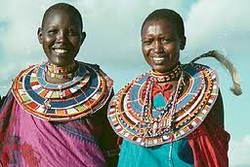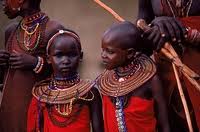 www.maasai-association.com
www.maasai-association.com I can't say I know everything about their situation, but I've gained a small insight. In 1990, my daughter and her British Kenyan husband lived in a lovely house just outside the district of Karen, Naorobi, where she'd established a small fashion business called Leo Creations. She wrote to me in England:
'I'm learning so much about life living in Kenya, because it's not so easy to avoid people as it is in a big city. There is a very small community here and even if I feel that I don't know anyone, everyone knows me ... Besides all that, everything is difficult, just like I knew it would be in the big wide world. I've discovered how insulated my life has been since I began modeling, and if I left that life for a challenging career, I've certainly come to the right place. I miss you, Mum and wish that somehow our lives were spent nearer one another so that we could share our experiences and pool our resources. There are so many families here, all pulling together and helping one another. I'm sad not to have my family around me. Nevertheless, I chose my own path and of course there's no going back. ...'

She drove us to the shops in a little banged-up run-around, stopping to give a lift to some of the many people walking beside the roadway. The locals were so friendly and bright. Traditional Massai people held themselves aloof in their settlements and I only caught sight of them every now and again, walking straight and proud.
Since then, my daughter has returned to Australia, although my two grandsons chose to go back to Kenya close to their father.
But, let me redirect your thoughts to the Massai people and their present situation.

The Massai wonder why they are not consulted or included. These ancient and sophisticated people know they are being exploited and they want it to stop. They have engaged the services of a company to help them take charge of their lives. Elders, together with a company Light Years IP, have been travelling around the country holding meetings and workshops. It's a huge task. According to some estimates, there could be as many as three million Maasai, in 12 districts, spread across a vast swathe of Kenya and Tanzania.
From what I've seen in the past, I think they have every right to halt the massive exploitation by businesses. I wouldn't like people to use my image in inappropriate ways. What if they used my photo as a typical old has-been and I saw an image that I'm unhappy with plastered over bill-boards and on the side of passing busses?

 RSS Feed
RSS Feed






